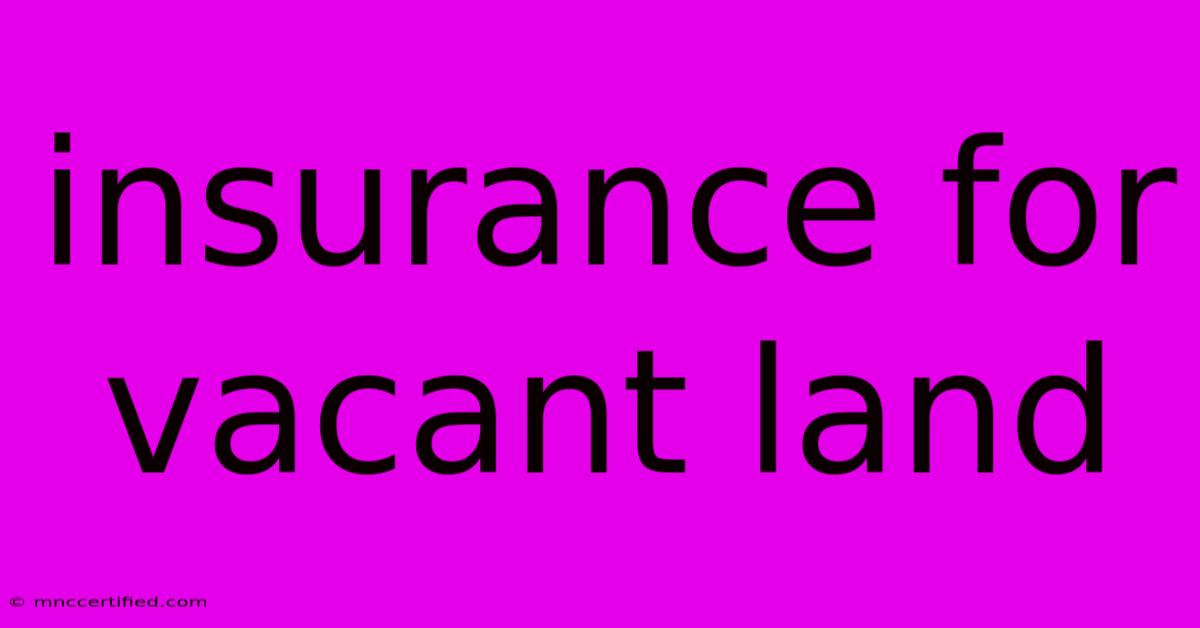Insurance For Vacant Land

Table of Contents
Insurance for Vacant Land: Protecting Your Investment
Owning vacant land presents a unique set of challenges, and one of the most crucial aspects to consider is insurance. While it might seem unnecessary to insure empty land, the reality is that vacant properties are vulnerable to a range of risks, from vandalism and theft to liability issues and environmental damage. This comprehensive guide explores the importance of vacant land insurance and helps you understand the different types of coverage available to protect your valuable investment.
Why Insure Vacant Land? It's More Than Just an Empty Lot
Many landowners underestimate the need for insurance on vacant land, mistakenly assuming that because there's no structure, there's no risk. This couldn't be further from the truth. Vacant land is susceptible to various perils that can lead to significant financial losses:
- Liability: Someone could be injured on your property, leading to expensive lawsuits. This could include slips, falls, or injuries sustained during trespassing. Liability insurance is crucial to cover such incidents.
- Vandalism and Theft: Equipment, fences, or even valuable topsoil can become targets for thieves and vandals. Comprehensive coverage protects against these losses.
- Fire: While less likely than on improved properties, wildfires or other accidental fires can still damage vegetation and cause significant environmental harm, leading to cleanup costs and potential penalties.
- Environmental Damage: Pollution, illegal dumping, or erosion can cause considerable environmental damage and result in costly remediation efforts.
- Natural Disasters: Storms, floods, and other natural disasters can inflict damage, particularly if your land is in a high-risk area.
Types of Insurance for Vacant Land: Finding the Right Coverage
Several types of insurance policies can protect your vacant land. The best choice depends on your specific circumstances, location, and the potential risks involved:
1. Vacant Land Liability Insurance: Protecting Against Lawsuits
This is perhaps the most crucial type of insurance for vacant land. It protects you from financial liability if someone is injured on your property, regardless of whether you were negligent. Liability insurance is essential, even if your land is seemingly isolated.
2. Property Insurance (with Vacant Land Endorsement): More Than Just Structures
Standard property insurance typically covers structures. However, many providers offer endorsements or specialized policies to cover vacant land against risks like fire, vandalism, and theft. This endorsement is vital to protect against damage to any improvements on the land, such as fencing or signage.
3. Environmental Liability Insurance: Mitigation of Environmental Hazards
If your land is in an area prone to environmental hazards, or if you have concerns about potential pollution or contamination, environmental liability insurance is highly recommended. This coverage protects you against the costs associated with cleanup and remediation.
4. Flood Insurance: Protection Against Water Damage
If your land is located in a flood-prone area, flood insurance is a critical component of your risk management strategy. Standard property insurance policies typically exclude flood damage. Check your local flood maps to assess your risk.
Finding the Right Insurance Provider: Shop Around and Compare
Obtaining insurance for vacant land involves comparing quotes from multiple providers. Factors affecting premiums include location, size of the property, presence of any improvements, and the level of coverage you require. Don't hesitate to ask questions and ensure you fully understand the terms and conditions of each policy. Consider working with an insurance broker who specializes in land insurance to navigate the options effectively.
Maintaining Your Land: Reducing Risk and Lowering Premiums
Proactive land management can significantly reduce your risk profile and potentially lower your insurance premiums. Consider these strategies:
- Regular Inspections: Conduct periodic inspections to identify and address any potential hazards or signs of damage.
- Secure Fencing: Install and maintain secure fencing to deter trespassing and vandalism.
- Weed Control: Regular weed control minimizes fire risks and improves the overall appearance of your property.
- Proper Signage: Post clear signage warning of hazards and indicating private property.
Protecting your vacant land investment is crucial. By understanding the risks and securing appropriate insurance coverage, you can safeguard your asset and mitigate potential financial losses. Don't let the absence of structures lull you into a false sense of security. Get the right insurance today.

Thank you for visiting our website wich cover about Insurance For Vacant Land. We hope the information provided has been useful to you. Feel free to contact us if you have any questions or need further assistance. See you next time and dont miss to bookmark.
Featured Posts
-
Hairy Bikers Best British Dishes
Dec 10, 2024
-
Actress Julie Stevens Dead At 87
Dec 10, 2024
-
New Planet Found In Cotton Candy System
Dec 10, 2024
-
Gnr Villa Park Concert Review
Dec 10, 2024
-
Bengals Beat Cowboys Chases Key Td
Dec 10, 2024